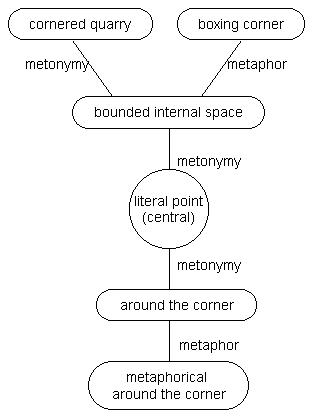
- The inebriated hippie caught his cape on the sharp corner of the table.
- The gregarious third-grader spent half the day sitting in the corner of the classroom.
- The referee sent the boxers back to their corners.
- By the end of his term, President Smith had only a handful of supporters in his corner.
- The pitcher has made his career throwing sliders over the outside corner of the plate.
- To get a neat fold, hold the corners of the tablecloth together.
- Good times are just around the corner.
- Our language revitalization project has turned a corner.
- The greedy collector cornered the market on Jar-Jar action figures.
- The journalist came back with an incredible photograph of a pack of wild dogs that had cornered a leopard up a tree.
- His grandmother lives on Pine Street, just around the corner from his apartment.
- Fluffy the cat cornered a fat white rat.
These example sentences contain a number of senses of the word corner. The following is my classification of these senses:

- to replace
- a replacement
- to substitute
- a substitute
- a substitution
- to succeed
- to supplant
These words all relate to a single frame. This frame could be called the replacing frame. This frame has the following features:
Some of these frame features are better highlighted by the different example words:
Various meanings are still possible with these different words.
American consumers have shown a disconcerting willingness to substitute sparkling wine for champagne...
No method substitutes for the skill and sensitivity of the class teacher...
In the first sentence, the substituting is performed by the external mover (consumer). In the second sentence, the substitution cannot adequately be performed at all because the second entity (method) cannot fulfill the role of the first entity (teacher's skill and sensitivity).
It is a taste that seems to be catching on in Japan, replacing a traditional fancy for whale meat...
...nor can we be called upon to replace your ticket with a new one.
In the first sentence, the replacing entity (the new taste) is replacing the old under its own power. In the second sentence, the old ticket is being replaced with a new one by an external mover (the ticket issuers).
| ~ztomasze Index:
CIS: Assignment 2 http://www2.hawaii.edu/~ztomasze |
Last Edited: 04 Oct 2002 ©2002 by Z. Tomaszewski. |